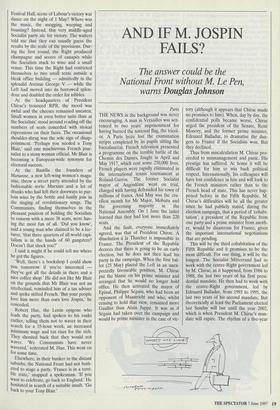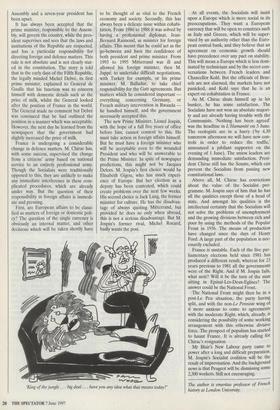AND IF M. JOSPIN FAILS?
The answer could be the National Front without M Le Pen, warns Douglas Johnson Paris THE NEWS in the background was never encouraging. A man in Versailles was sen- tenced to two years' imprisonment for having burned the national flag, the tricol- or. A Paris lycee lost the examination scripts completed by its pupils sitting the baccalaureat. French television presented a programme on the terrible battle of the Chemin des Dames, fought in April and May 1917, which cost some 250,000 lives. French players were rapidly eliminated in the international tennis tournament at Roland-Garros. The former Socialist mayor of Angouleme went on trial, charged with having defrauded his town of millions of francs. And May was the cru- ellest month for Mr Major, Mobutu and the governing majority in the National Assembly. On 1 June the latter learned that they had lost more than 220 seats.
And the fault, everyone immediately agreed, was that of President Chirac. A dissolution a la Thatcher is impossible in France. The President of the Republic decrees that there is going to be an early election, but he does not then lead his party in the campaign. When the first bal- lot (25 May) placed the Left in an unex- pectedly favourable position, M. Chirac put the blame on his prime minister and arranged that he would no longer hold office. He then activated the mayor of Epinal, Philippe Seguin, who had been an opponent of Maastricht and who, whilst ceasing to hold that view, remained more Gaullist than Main Juppe. It was as if Seguin had taken over the campaign and would be prime minister in the case of vic- tory (although it appears that Chirac made no promises to him). When, day by day, the confidential polls became worse, Chirac urged the president of the Senate, Rene Monory, and the former prime minister, Edouard Balladur, to dramatise the dan- gers to France if the Socialists won. But they declined.
Thus from miscalculation M. Chirac pro- ceeded to mismanagement and panic. His prestige has suffered. At home it will be difficult for him to win back political respect. Internationally, his colleagues will have lost confidence in him and will look to the French ministers rather than to the French head of state. This has never hap- pened before in the Fifth Republic. M. Chirac's difficulties will be all the greater since he had publicly stated, during the election campaign, that a period of 'cohabi- tation', a president of the Republic from one party and a prime minister from anoth- er, would be disastrous for France, given the important international negotiations that are pending.
This will be the third cohabitation of the Fifth Republic and it promises to be the most difficult. For one thing, it will be the longest. The Socialist Mitterrand had to work with the centre-Right government led by M. Chirac, as it happened, from 1986 to 1988, the last two years of his first presi- dential mandate. He then had to work with the centre-Right government, led by Edouard Balladur, from 1993 to 1995, the last two years of his second mandate. But theoretically at least the Parliament elected last Sunday will last until the year 2002, which is when President M. Chirac's man- date will expire. The rhythm of a five-year Assembly and a seven-year president has been upset.
It has always been accepted that the prime minister, responsible to the Assem- bly, will govern the country, while the pres- ident supervises and sees that the laws and institutions of the Republic are respected, and has a particular responsibility for directing foreign and defence matters. This rule is not absolute and is not clearly stat- ed in the constitution. The story is told that in the early days of the Fifth Republic, the legally minded Michel Debre, its first prime minister, explained to General de Gaulle that his function was to concern himself with domestic details such as the price of milk, whilst the General looked after the position of France in the world. The General made no comment but Debre was convinced that he had outlined the position in a manner which was acceptable. However, the next day he learned from the newspapers that the government had slightly increased the price of milk.
France is undergoing a considerable change in defence matters. M. Chirac has, with some success, supervised the change from a citizens' army based on national service to an entirely professional army. Though the Socialists were traditionally opposed to this, they are unlikely to make any immediate interference in these com- plicated procedures, which are already under way. But the question of their responsibility in foreign affairs is immedi- ate and pressing.
First, are European affairs to be classi- fied as matters of foreign or domestic poli- cy? The question of the single currency is obviously an internal matter, and other decisions which will be taken shortly have to be thought of as vital to the French economy and society. Secondly, this has always been a delicate issue within cohabi- tation. From 1986 to 1988 it was solved by having a professional diplomat, Jean- Bernard Raimond, as minister for foreign affairs. This meant that he could act as the go-between and have the confidence of both president and prime minister. From 1993 to 1995 Mitterrand was ill and allowed his foreign minister, then M. Juppe, to undertake difficult negotiations, with Turkey for example, or his prime minister, M. Balladur, to take chief responsibility for the Gatt agreements. But matters which he considered important — everything concerning Germany, or French military intervention in Rwanda — he handled himself, and the government necessarily accepted this.
The new Prime Minister, Lionel Jospin, with the hope of a full five years of office before him, cannot consent to this. He must take action in foreign affairs himself. But he must have a foreign minister who will be acceptable even to the wounded President and who will be answerable to the Prime Minister. In spite of newspaper predictions, this might not be Jacques Delors. M. Jospin's first choice would be Elisabeth Gigou, who has much experi- ence of Europe. But her election as a deputy has been contested, which could create problems over the next few weeks. His second choice is Jack Lang, the former minister for culture. He has the disadvan- tage of always quoting Mitterrand, but provided he does so only when abroad, this is not a serious disadvantage. But M. Jospin's former rival, Michel Rocard, badly wants the post.
'King of the jungle . . . big deal. . . have you any idea what that means today?' At all events, the Socialists will insist upon a Europe which is more social in its preoccupations. They want a European currency that will be open to countries such as Italy and Greece, which will be super- vised by an authority other than the Euro- pean central bank, and they believe that an agreement on economic growth should have precedence over any pact on stability. This will mean a Europe which is less dom- inated by technicians and by the secret con- versations between French leaders and Chancellor Kohl. But the officials of Brus- sels are not alarmed, the markets have not panicked, and Kohl says that he is an expert on cohabitation in France.
As M. Chirac shuts himself up in his bunker, he has some satisfaction. The Socialists have not won an absolute majori- ty and are already having trouble with the Communists. `Nothing has been agreed' was the headline in L'Humanite on 3 June. The ecologists are in a hurry ('by 4.30 tomorrow afternoon we will have new con- trols in order to reduce the traffic,' announced a jubilant supporter on the evening of 1 June). The union leaders are demanding immediate satisfaction. Presi- dent Chirac still has the Senate, which can prevent the Socialists from passing new constitutional laws.
Above all, M. Chirac has convictions about the value of the Socialist pro- gramme. M. Jospin says of him that he has all the qualities except those of a head of state. And amongst his qualities is the intellectual certainty that the Socialists will not solve the problems of unemployment and the growing divisions between rich and poor by using the methods of the Popular Front in 1936. The means of production have changed since the days of Henry Ford. A large part of the population is nec- essarily excluded.
France is unstable. Each of the five par- liamentary elections held since 1981 has produced a different result, whereas for 23 years previous to 1981 all the governments were of the Right. And if M. Jospin fails, what next? Will it be the turn of the man sitting in Epinal-Les-Deux-Eglises? The answer could be the National Front.
The National Front might then be in a post-Le Pen situation, the party having split, and with the non-Le Penniste wing of it more anxious to come to agreements with the moderate Right, which, already, is considering the possibility of some working arrangement with this otherwise divisive force. The prospect of populism has started to haunt France. It is already calling for Chirac's resignation. Mr Blair's New Labour party came to power after a long and difficult preparation. M. Jospin's Socialist coalition will be the result of improvisation. And the background news is that Peugeot will be dismissing some 2,300 workers. Still not encouraging.
The author is emeritus professor of French history at London University.











































































 Previous page
Previous page